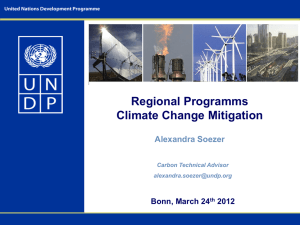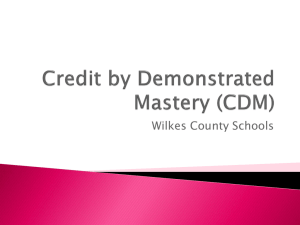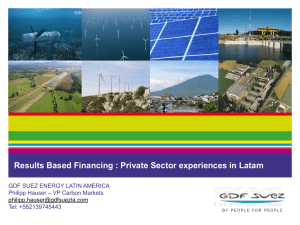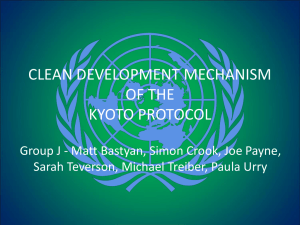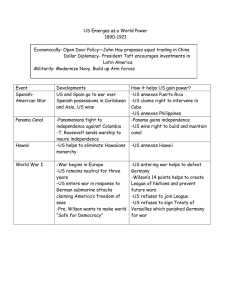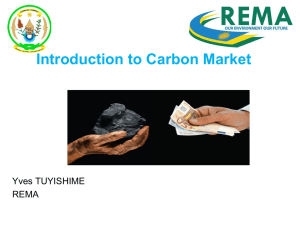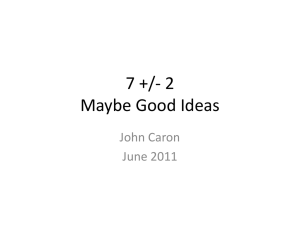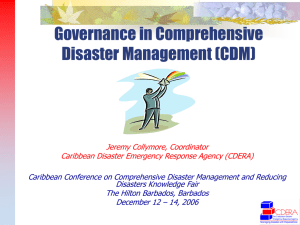Jamaica*s CDM Experience and NAMA Prospects
advertisement
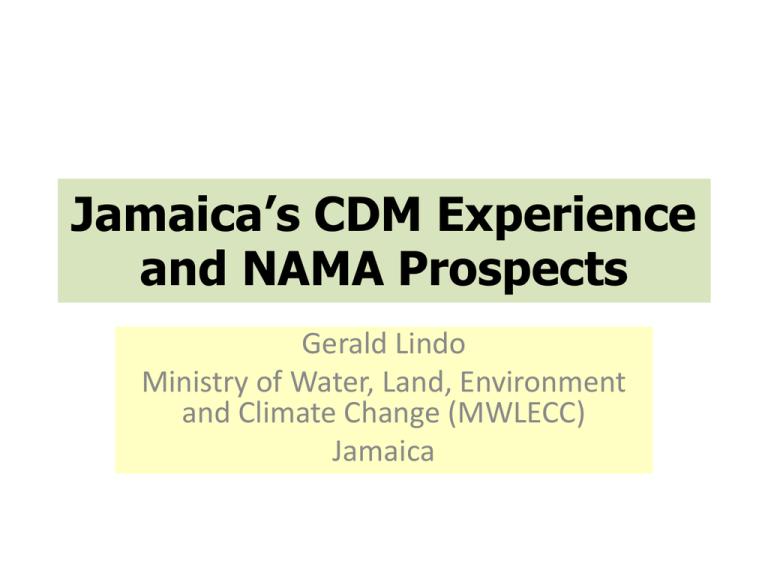
Jamaica’s CDM Experience and NAMA Prospects Gerald Lindo Ministry of Water, Land, Environment and Climate Change (MWLECC) Jamaica The Country Context: Small, Vulnerable, Lots of Potential • Small island state – High vulnerability to climate change • Energy import dependent – 91% of energy overall and 94% of electricity fossil fuel based (HFO, Diesel) – Mitigation potential low, but mitigation options have excellent economics • Heavily indebted, weak growth Bullish on CDM… • The strong impression among policy makers that there were good financing opportunities in “carbon credits” • Rush of project submissions between 2004-2008 • Policies were built with CDM opportunities in mind – Aug 2008- National Carbon Emissions Trading Policy • Halt to new project registration – Sep 2008 - Policy Task Force formed @ Ministry of Energy and Mining – Draft Carbon Trading Policy prepared June 2009 – Energy and sub-policies integrated CC considerations • Gov’t hired a CDM consultant who was made available to the private sector … until the carbon market bust! • PoA for utility company designed but abandoned • Over 20 project submissions led to only 2 projects following through – both by Gov’t entity • Locked out of ETS, leading to uncertainty • Draft Carbon Trading Policy in limbo Wigton Wind Farm • Two projects from 2 expansion phases – Ref: 0239, 5522 – Total reductions of 52540 and 40348 T CO2e / year • ER purchase agreement with CAF ended 2012 • Challenge: making verification of latest CERs worth the transaction costs – Possibilities: Gold Standard; working through Bunge Emissions Holdings The lessons: better C prices, capacity, lower transaction costs desired • Emission reductions projects still have good returns, but benefits of CDM usually marginal to bottom line • Transaction costs high – Exacerbated by lack of local capacity (all steps of project cycle require importation of expertise) • Lack of investor confidence in CDM still needs to be overcome • Policy missteps? Good news: the fundamental economics and benefits of energy projects that reduce emissions have not changed -US$50 Wind Hydro -US$150 Bagasse -US$100 Solar $/tCO2e US$0 Waste to energy Marginal Abatement Cost Curve for Renewable Energy Generation in Jamaica (2015-2030) -US$200 Thousands of tCO2e saved/year -US$250 0 100 200 300 400 500 1st NAMA(s) will be RE focused • Draft NAMA prepared in collaboration with OLADE: “Jamaica Renewable Energy Support Programme” • • • • • • Pre-existing policy target: 20% of energy from RE by 2030 Analysis of vision, policies, action plans Barrier analysis Institutional assessment EMISSION REDUCTION ANALYSIS MRV • Finalization by end of Q4, 2014 NAMAs = mitigation + development + adaptation = Resilience • Jamaica has a unique opportunity, inasmuch as ANY energy sector reform will likely reduce energy costs while giving SD benefits! – Lower costs – Increased competitiveness … which equals RESILIENCE! CDM’s structure and methods brings a discipline and robustness to projects and programmes, which can help us get the help we need How about a RAMA? • To overcome capacity and scale issues, Jamaica is contemplating uniting with regional partners to create Regionally Appropriate Mitigation Actions – Sharing expertise – Larger programmes more attractive to investors, and have lower transaction costs (same rationale for PoAs) Thank you! gerald.lindo@mwlecc.gov gerry.lindo@gmail.com @geraldlindo

